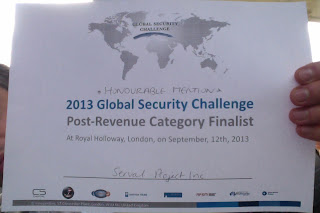Earlier in the year we entered the Serval Project into the Global Security Challenge.
The theme for this year's challenge was cyber-security, something that we felt was a good fit for the Serval Mesh, with its encrypted-by-default operation, ease of use, and applicability to a wide range of situations.
The recent revelations of wide-spread wire-tapping by the NSA, GCHQ and others has only served to reinforce the relevance of a secure digital mobile communications platform that never gives unencrypted access to your communications to carriers or other organisations that might be pressured by agencies like the NSA.
So it was very pleasing when we were named finalists last month and invited to pitch at the grand final that was held yesterday here in London.
The grand final itself was an interesting event, with a diverse range of finalists from the UK, the USA, Israel, Sweden, Canada and Spain, and of course ourselves as the sole representative from the Southern hemisphere. We were also unique in that we were the only social enterprise present.
Each finalist had six minutes to give a pitch, and then a ten minute question and answer session with the judges. These were combined with the material that we had already submitted to determine the winner of each category.
The day was divided into pre-revenue and post-revenue companies. I am not sure that they knew quite how to place us, because while we have received over a million dollars in philanthropic funding, we haven't made any commercial sales.
They had to make a decision, and that was to place us in the post-revenue category. This placed us in the category with a number of innovative start-ups who are already active in the market place, and with business models and solutions that are well aligned with the existing security industry, and representing a formidable field for us to compete against.
So it was very pleasing when it was announced that we had come a close second place in our category. So close in fact, that they took the unusual step of awarding us an Honourable Mention, which apparently is not something that they normally do. You can get an idea of how unusual this is by the handwritten annotation of honourable mention on the certificate:
While it would have been nice to win outright, it was an amazing affirmation for us to be named in the list of the ten most promising security related endeavours, and then to be recognised in this unusual way.
This is now the third time in the last three months that we have been recognised for our innovation in secure communications, following winning the communications category of The Technology Challenge for Atrocity Prevention, and being the only non-US entity accepted to present at a recent DARPA symposium on secure mesh networks.
Of course, none of this would have been possible without our team, or the support of Flinders University, the Shuttleworth Foundation, the New America Foundation, the NLnet Foundation and the Awesome Foundation and our many individual donors and volunteers.
The theme for this year's challenge was cyber-security, something that we felt was a good fit for the Serval Mesh, with its encrypted-by-default operation, ease of use, and applicability to a wide range of situations.
The recent revelations of wide-spread wire-tapping by the NSA, GCHQ and others has only served to reinforce the relevance of a secure digital mobile communications platform that never gives unencrypted access to your communications to carriers or other organisations that might be pressured by agencies like the NSA.
So it was very pleasing when we were named finalists last month and invited to pitch at the grand final that was held yesterday here in London.
The grand final itself was an interesting event, with a diverse range of finalists from the UK, the USA, Israel, Sweden, Canada and Spain, and of course ourselves as the sole representative from the Southern hemisphere. We were also unique in that we were the only social enterprise present.
Each finalist had six minutes to give a pitch, and then a ten minute question and answer session with the judges. These were combined with the material that we had already submitted to determine the winner of each category.
They had to make a decision, and that was to place us in the post-revenue category. This placed us in the category with a number of innovative start-ups who are already active in the market place, and with business models and solutions that are well aligned with the existing security industry, and representing a formidable field for us to compete against.
So it was very pleasing when it was announced that we had come a close second place in our category. So close in fact, that they took the unusual step of awarding us an Honourable Mention, which apparently is not something that they normally do. You can get an idea of how unusual this is by the handwritten annotation of honourable mention on the certificate:
While it would have been nice to win outright, it was an amazing affirmation for us to be named in the list of the ten most promising security related endeavours, and then to be recognised in this unusual way.
This is now the third time in the last three months that we have been recognised for our innovation in secure communications, following winning the communications category of The Technology Challenge for Atrocity Prevention, and being the only non-US entity accepted to present at a recent DARPA symposium on secure mesh networks.
Of course, none of this would have been possible without our team, or the support of Flinders University, the Shuttleworth Foundation, the New America Foundation, the NLnet Foundation and the Awesome Foundation and our many individual donors and volunteers.
